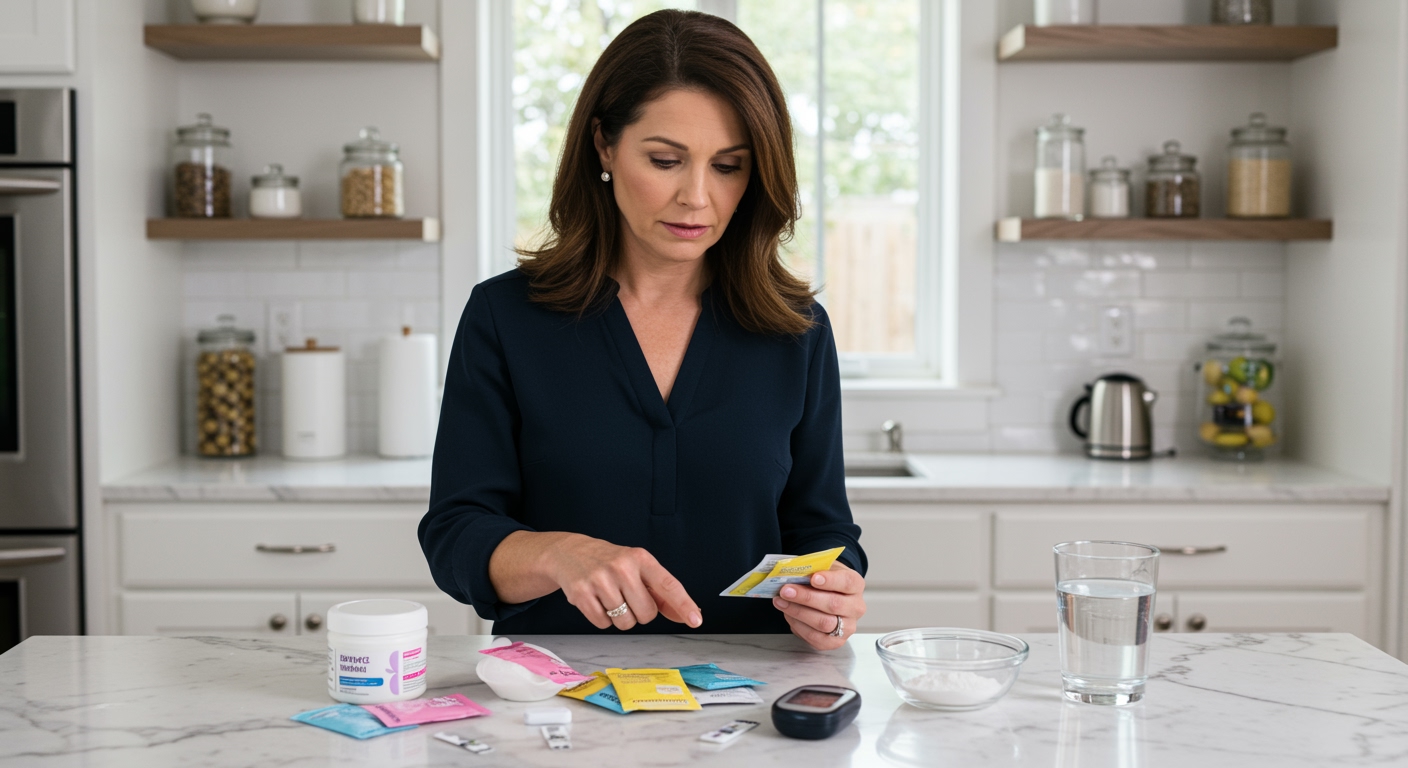✪ Key Takeaway: Most artificial sweeteners are safe for diabetics, but some may affect blood sugar and gut health differently than expected.
Introduction
You reach for that diet soda thinking you made the smart choice for your diabetes.
But then you wonder if artificial sweeteners are really as harmless as everyone claims they are.
Hi, I’m Abdur, your nutrition coach and today I’m going to explain everything you need to know about artificial sweeteners and diabetes management.
Do Artificial Sweeteners Raise Blood Sugar?
Most artificial sweeteners do not directly raise blood sugar levels.
Your body cannot break down these synthetic compounds the same way it processes regular sugar.
Aspartame, sucralose, and saccharin pass through your digestive system without being absorbed into your bloodstream.
This means they provide zero calories and have minimal impact on your glucose levels.
However, recent studies suggest some artificial sweeteners might affect your blood sugar in indirect ways.
They can alter your gut bacteria, which plays a crucial role in glucose metabolism and insulin sensitivity.
Some people also experience cravings for sweet foods after consuming artificial sweeteners, leading to poor food choices later.
✪ Fact: Artificial sweeteners are 200 to 700 times sweeter than regular sugar, so tiny amounts satisfy your sweet tooth.
Which Artificial Sweeteners Are Best For Diabetics?
Stevia stands out as one of the safest options for people with diabetes.
This natural sweetener comes from the stevia plant and has been used safely for centuries.
Research shows stevia may actually help improve insulin sensitivity and lower blood pressure.
Erythritol is another excellent choice because it has almost no effect on blood sugar or insulin levels.
Your body absorbs only about 10% of erythritol, and the rest gets eliminated through your urine unchanged.
Monk fruit sweetener also works well for diabetics because it contains zero calories and does not affect glucose levels.
Avoid artificial sweeteners like maltitol and other sugar alcohols that can cause digestive issues and may slightly raise blood sugar.
✪ Pro Tip: Start with small amounts of any new sweetener to see how your body responds before making it a regular part of your diet.
Can Artificial Sweeteners Cause Weight Gain In Diabetics?
The relationship between artificial sweeteners and weight management is more complex than most people realize.
While these sweeteners contain no calories, they might still contribute to weight gain through behavioral changes.
Some people develop a psychological justification that allows them to eat more calories elsewhere because they saved calories with artificial sweeteners.
Artificial sweeteners can also disrupt your natural ability to gauge sweetness and satisfaction from food.
This disruption may lead to increased cravings for sweet foods and larger portion sizes.
Research suggests that people who regularly consume artificial sweeteners may have higher body weights compared to those who avoid them entirely.
However, when used as part of a structured meal plan, artificial sweeteners can help diabetics reduce their overall calorie intake and maintain stable blood sugar levels.
✪ Note: Focus on whole foods and use artificial sweeteners as occasional tools rather than daily staples for best results.
What Are The Side Effects Of Artificial Sweeteners?
Most people can consume artificial sweeteners without experiencing serious side effects.
However, some individuals may develop headaches, digestive upset, or mood changes when consuming large amounts.
Aspartame can cause problems for people with a rare genetic condition called phenylketonuria (PKU).
Sugar alcohols like sorbitol and xylitol can cause bloating, gas, and diarrhea when consumed in large quantities.
Some people report experiencing increased cravings for sweet foods after regularly using artificial sweeteners.
Recent studies also suggest that certain artificial sweeteners might negatively affect your gut microbiome.
A healthy gut microbiome is essential for proper glucose metabolism and overall immune function in diabetics.
✪ Fact: The FDA has approved six artificial sweeteners as safe for human consumption, including aspartame, sucralose, and saccharin.
How Should Diabetics Use Artificial Sweeteners?
The key to using artificial sweeteners successfully as a diabetic is moderation and mindfulness.
Use them as tools to help transition away from high-sugar foods rather than as permanent replacements for natural sweetness.
Start by reducing the overall sweetness level in your diet gradually over time.
This approach helps retrain your taste buds to appreciate less intense sweetness from natural sources like fruits.
Monitor your blood sugar levels when trying new artificial sweeteners to see how your body responds individually.
Choose whole food sources of sweetness whenever possible, such as berries, apples, or small amounts of dates.
Remember that the goal is not just blood sugar control but overall long-term health and sustainable eating habits.
✪ Pro Tip: Keep a food diary to track how different artificial sweeteners affect your blood sugar, mood, and cravings.
The Bottom Line
Artificial sweeteners can be useful tools for diabetics when used thoughtfully and in moderation.
The best sweetener is the one you use least often because your ultimate goal should be reducing your dependence on intensely sweet flavors altogether.
I would love to hear about your experiences with artificial sweeteners or any questions you might have about managing diabetes through nutrition, so please share your thoughts in the comments below.
References
At NutritionCrown, we use quality and credible sources to ensure our content is accurate and trustworthy. Below are the sources referenced in creating this article:





